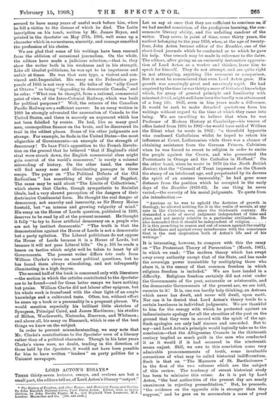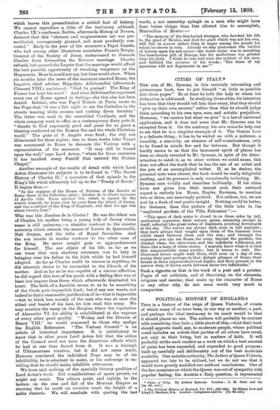LORD ACTON'S ESSAYS.* THESE thirty-seven lectures, essays, and reviews are
but a small part, the editors tell us, of Lord Acton's literary "output."
• The History. of Freedom, and other Essaus ; and Historical Essays and Studies. n
By John Emech Dalberg-Acton, First Baron Acton. Edited, with an Intro- duction, by John Neville Figgis„ M.A., and Reginald Vere Laurence, M.A. London: Macmillan and Co. [10s. net each.)
Let us say at once that they are sufficient to convince us, if we had needed conviction, of the prodigious learning, the con- summate literary ability, and the unfailing candour of the
writer. They cover, in point of time, some thirty years, the earliest belonging to the year 1858, when, at the age of twenty-
four, John Acton became editor of the Rambler, one of the short-lived journals which he conducted or to which he gave
his help. One remark may be made in reference to the dates. The editors, after giving us an eminently instructive apprecia- tion of Lord Acton as a worker and thinker, leave him to
speak for himself. They do not attempt., and are quite right in not attempting, anything like comment or comparison. But it must be remembered that even Lord Acton grew. His growth was amazingly great and amazingly rapid. He had
acquired by the time he was thirty a mass of historical knowledge which, for grasp of general principle and familiarity with minutest detail, might well have been the hardly won attainment of a long life. Still, even in him years made a difference.
It would be rash to make detached quotations from his writings without regard to the time at which they came into being. We are unwilling to believe that when he was Professor of Modern History at Cambridge—his tenure of office lasted from 1895 to 1902—be would have said of William the Silent what he wrote in 1862: "a threefold hypocrite who confessed Catholicism whilst he hoped to retain his influence at Court, Lutheranism while there was a chance of obtaining assistance from the German Princes, Calvinism when he was forced to resort to religion in order to excite
the people against the Crown, and who persecuted the Protestants in Orange and the Catholics in Holfand." On the other hand, when he wrote in 1870 (in the North British Review) that the "Council of Trent impressed on the Church the stamp of an intolerant age, and perpetuated by its decrees the spirit of an austere immorality," he had gone some distance from the position which he occupied in the early days of the Rambler (1858-62). In one thing he never varied,—the severity of his moral judgments. To quote from the introduction :—
"Anxious as he was to uphold the doctrine of growth in theology, he allowed nothing for it in the realm of morals, at any rate in the Christian era, since the thirteenth century. He demanded a code of moral judgment independent of time and place, and not merely relative to a particular civilization. He also demanded that it should be independent of religion It is this preaching in season and out of season against the reality of wickedness and against every interference with the conscience that is the real inspiration both of Acton's life and of his writings."
It is interesting, however, to compare with this the essay on "The Protestant Theory of Persecution" (March, 1861), in which we read: "The modern theory which has swept away every authority except that of the State, and has made the sovereign power irresistible by multiplying those who share it, is the enemy of that common freedom in which religious freedom is included." We are here landed in a
difficulty. Religious freedom certainly did not exist under the Governments of the past, autocratic or aristocratic, and the democratic Governments of the present are, we are told, enemies to it! It is, one Can hardly help thinking, an Astraea which never has dwelt, and never will dwell, upon earth.
Nor can it be denied that Lord Acton's theory tends to a certain harshness in individual judgments. We are thankful to him for the energy with which he protested against an indiscriminate apology for all the atrocities of the past on the ground that they were in accord with the spirit of the age.
Such apologies are only half sincere and one-sided. But tc say—and Lord Acton's principle would logically take us to the conclusion—that the Albigensian Crusade in the thirteenth century implied as much guilt in the men who conducted it as' it would if it had occurred in the nineteenth seems unjust. Still, we owe to this conviction some very admirable pronouncements of truth, some invaluable corrections of what may be called historical indifferentism.
Such is that on "The Massacre of St. Bartholomew" in the first of the two volumes which are the subject of this review. The tendency of recent historical study has been to minimise this crime. As it is put by Lord Acton, "the best authorities of the present day are nearly unanimous in rejecting premeditation." But,. he proceeds, "the evidence on the opposite side is stronger than they suppose," and he goes on to accumulate a mass of proof
which leaves this premeditation a settled fact of history.
We cannot reproduce a tithe of the testimony adduced. Charles IX.'s confessor, Sorbin, afterwards Bishop of Nevers, declared that this "clement and magnanimous act was pre- meditated, courageously planned, and most prudently con- cealed." Early in the year of the massacre a Papal Legate, who had among other illustrious associates Francis Borgia, General of the Society of Jesus, endeavoured to dissuade Charles from forwarding the Navarre marriage. Charles refused, but assured the Legate that the marriage would afford the best possible opportunity of wreaking vengeance on the Huguenots. More he could not say, but time would show. When six months later the news of the massacre reached Rome, the Legate's chief adviser, Hippolyto Aldobrandini (afterwards Clement VIII.), exclaimed : "God be praised! The King of France has kept his word." And what Aldobrandini expressed every one at Rome agreed in feeling,—for this also has been denied. Salviati, who was Papal Nuncio in Paris, wrote to the Pope that "it was a fair sight to see the Catholics in the streets wearing white crosses and cutting down heretics."
The letter was read to the assembled Cardinals, and the whole company went to offer, as a contemporary diary puts it,
"thanks to God supremely good and great for so great a blessing conferred on the Roman See and the whole Christian world." The guns of S. Angelo were fired ; the city was illuminated for three nights ; two or three weeks later Vasari was summoned to Rome to decorate the Vatican with a representation of the massacre. "It may still be traced upon the wall," says Lord Acton, "where for three centuries it has insulted every Pontiff that entered the Sixtine
Chapel"
Another example of the wealth of detail with which Lord
Acton illustrates his subjects is to be found in "The Secret History of Charles II.," a narrative of that episode in the King's life which ultimately led up to the "Treaty of Dover."
It begins thus :—
"In the register of the House of Novices of the Jesuits at Rome there is the following entry : Jacobus de la Cloche ingressus 11 Aprais 1668. From another list, which is signed by the novice himself, we learn that he came from the island of Jersey, and was a subject of the Sing of England; and that his age was about twenty-four."
Who was this Jacobus de la Cloche ? He was the eldest son of Charles, his mother being a young lady of Jersey whose
name is still unknown,—a singular contrast to the sinister notoriety which attends the names of Louise de Querouaille, Nell Gwynn, and the tribe of Royal favourites. And the son stands in similar contrast to the other sons of the King. He never sought gain or aggrandisement for himself. The one object of his life, as far as we can trace that very shadowy existence, was to help in bringing over his father to the faith which he had himself adopted. As far as Charles could be sincere in anything, be did sincerely desire to be reconciled to the Church of his mother. And as far as be was capable of a sincere affection, he did regard this love of his youth with a feeling that was at least less impure than those which afterwards dominated his heart. The faith of a Jacobite seems to us to be something of the Credo quia impossibile kind ; but if any one wants, not indeed to find a reasonable justification of it—that is impossible —but to think less meanly of the man who was at once the ablest and basest of his race, let him read this essay. We may mention the essay on the Borgias, where the reputation of Alexander VI. for ability is rehabilitated at the expense of every other good quality. " Wolsey and the Divorce of Henry VIII." we would commend to those who malign the English Reformers. "The Vatican Council" is an article of historical importance. It is satisfactory to know that in after years Lord Acton felt that the action
of the Council need not have the disastrous effects which he had at one time feared from it. It was a triumph of Ultramontane reaction, but it did not mean much. However convinced the individual Pope may be of his
infallibility, he is reluctant to make, or his entourage is un- willing that he should make, infallible utterances.
We have said nothing of the specially literary qualities of Lord Acton's work. Did considerations of space permit, we might say much. The editors point, and rightly, to the
lecture on the rise and fall .of the Mexican Empire as showing that be could on occasion reach the height of a
noble rhetoric. We will conclude with quoting the last
words, a not unworthy epitaph on a man who might have done better things than fate allowed him to accomplish, Maximilian of Mexico :— "The memory of the fair-haired stranger, who devoted his life to the good of Mexico, and died for guilt which was not his own, will live in sorrow rather than in anger among the people for whom he strove in vain. Already we may pronounce the verdict of history upon his sad careor—his worst crime was in accepting the treacherous gift of Europe, but his misfortune was greater than his fault. I think he was well nigh the noblest of his race, and fulfilled the promise of his words : The fame of my ancestors will not degenerate in me."





































 Previous page
Previous page